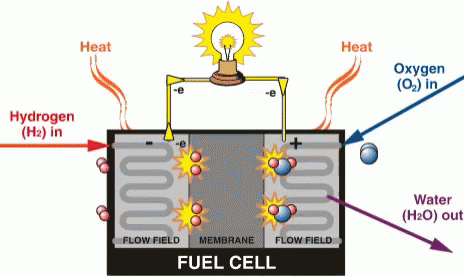What is fuel cell?
A fuel cell is an electrochemical device that converts the chemical energy of a fuel and an oxidizing agent into electrical energy, heat, and water through a redox reaction. Fuel cells operate much like a battery, but instead of storing energy, they continuously generate electricity as long as fuel and oxidizing agents are supplied to the cell.

COMPONENTS
The basic components of a fuel cell include an anode (negative electrode), a cathode (positive electrode), an electrolyte, and a catalyst. The fuel is supplied to the anode, and the oxidizing agent, usually oxygen, is supplied to the cathode. The electrolyte is a substance that allows ions to move between the anode and cathode, while preventing the mixing of the fuel and oxidant.
WORKING
As the fuel and oxidizing agent react at the electrodes, electrons are released and travel through an external circuit, generating electrical energy. The ions that are produced in the reaction, usually protons, pass through the electrolyte and combine with electrons and the oxidizing agent to form water or other byproducts.


Advantages
Fuel cells have several advantages over conventional energy sources, such as internal combustion engines. They are more efficient, producing more electricity per unit of fuel than traditional combustion processes. They also produce less pollution and greenhouse gas emissions, making them a more environmentally friendly option. Fuel cells can be used in a variety of applications, including transportation, stationary power generation, and portable electronics. However, the high cost and limited availability of fuel cell components, such as catalysts and electrolytes, have limited their widespread adoption.
PEM FUEL CELL TEST STATION
Here, you can watch the PEM Based Fuel cell test station working demo combined with our Origalys France Electrochemical workstation, it is possible explore voltammetry sutdies like CV, LSV , Constant discharge and impedance spectroscopy much more.


